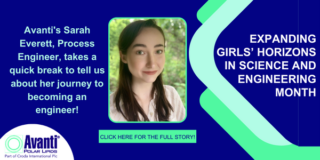Sarah Everett - Process Engineer

My name is Sarah Everett, Process Engineer II. I am originally from Tennessee but have spent the last ~10 years here in Alabama. I received my Bachelor of Chemical and Biological Engineering from the University of Alabama in 2018 and my Master of Science in Biotechnology from the University of Alabama at Birmingham in 2020. My hobbies are varied – I enjoy so many different things. On any given day I could be reading some romance book, redesigning my island in Animal Crossing, saving the galaxy in Mass Effect, tending to my plants, or making something that is way too complicated for my skill set for a cosplay I have planned.
Why did you choose this career?

Sorry but this will not be a short answer. When I was in high school and undergrad, I wanted to go to med school. I had experienced a significant amount of personal tragedy and had seen too many close family members suffer from cancer. I was sick of it. I wanted to prevent people from experiencing that kind of pain. Two of my high school teachers told me that if I pursued engineering over biology, I would receive more scholarships and would stand out to med schools, so I took their advice and decided to get my undergrad in chemical engineering. I was interested in the concept of learning how to think, and problem solve instead of becoming a memorization machine. Unfortunately, misery loves company. I struggled to perform in undergrad because 1) life continued to be difficult and 2) I was never challenged in grade school, so I was a bad student. In a span of about two years, I lost my grandmother, great aunt, step aunt, and dad all to cancer. I even quit school to take care of my dad by myself while he was dying. When I returned to school after his death, I barely graduated. My GPA was at least a whole point lower than most med schools would even accept as their application minimum, but I still had a dream. So, I talked to academic advisors about what my options were. I was advised to try and get into a post-grad/master’s program to show that I could perform academically at high levels. Most places I applied to still had minimum GPA requirements that I did not meet, but I applied anyway. I was a strong candidate. I had letters of recommendation from my research professor, my department head, and the district manager of pharmacy from my then-job. I knew I could do it if someone was willing to take a risk. In the online application, you had to type in your GPA even though I had already attached my transcript. I filled that box with as many zeros as I could – hoping the computer would read it as an error and not automatically reject my application. Two weeks later, I got an acceptance email while watching a local high school soccer game. I cried like a baby. I loved my master’s program. We learned so much about the pharmacy industry, and I thrived. One day during one of the lab sections, a former student came and spoke to us. He had been through the program about ten years previously and then got his MD/PhD. Our program director asked him why he was not practicing medicine and why he was working for a biotech company instead. His response was, “If I am a doctor, I can save thousands of people’s lives. If I work in research, I can save millions. Thousands just is not good enough.” I felt like I had been hit by a truck. All I had ever genuinely wanted was to help as many people as possible, and this man had just effectively told me that my dream wasn’t aligned with what I wanted. I went home and cried on the couch with my roommate as I told her about my day, and the next morning I changed my career path. I wanted to work in the pharmaceutical industry and ditch my decade long plan of med school. I finished my masters during the middle of the COVID pandemic and started working as an engineer with the goal of one day supporting a company that was truly making a difference in the world. Now here I am, fulfilling my true dream and purpose.

What is your current role like? What excites you the most about your job?
As a process engineer, it is my job to support GMP manufacturing and to address their needs as soon as they arise. There are many responsibilities associated with this. We do anything from qualifying equipment to qualifying entire buildings and their facilities/utilities. My specialized area outside of supporting GMP is process validation. This document-heavy task is how we verify that we are in control of our processes and prove to the FDA that ‘we know what we are doing.’
What excites me most is knowing that building a strong process validation program here at Avanti will keep us around for years to come. When we really sit with a process and analyze it in its entirety, you really start to unravel what is necessary and what is not. You find ways to improve, to streamline. Process validation feeds into continual process improvement, and as we improve ourselves, we improve patients lives.
What does an average week look like for you?
As an engineer, every week is different. We are expected to be like a leaf in the wind, in some ways. We need to go with the flow and not get flustered as goals and priorities change. I can have some weeks where I am mostly at my desk preparing large document packets, and some weeks I will be elbow deep cleaning a new piece of equipment as part of its installation qualification.
What are your career aspirations?

My only goal is to help as many people as possible. Wherever that goal pushes me is where I will be. I do not have tangible milestones like being a manager or a director. My career goal is more about giving back than about self-promotion.
What are your biggest challenges? What are the compromises?
I struggle when I feel like I am not completing projects. Sometimes, projects can take multiple months or can even be on the scale of years. It is hard to look back on ‘deliverables’ and see that most of that is just documents that are still being circulated for review and approval. I like checking things off my to-do list. So, I’ve learned to celebrate smaller victories and make my list more accommodating to that idea. Instead of ‘release building 1300’ it is now ‘get the chromatography pump qualification for 1300 edited and released’. They are still small victories, but it helps me be less harsh with myself.
What skills would you consider the most crucial to succeed in this career? What type of person do you need to be?
The ability to immediately admit your mistakes is such a powerful tool. We are all going to make mistakes – we are human. The sooner you can communicate that to the people in your team, the sooner you can fix the problem and even prevent the problem from propagating into something even worse.
You need to be someone who truly cares about this field. We work on things that go into people and can even save their lives. If we become apathetic to that cause, we can become jaded and not do as good a job.
What advice would you give to the next generation of female engineers?
Speak up. Stand out. Fight back. Make yourself seen, heard, and understood. Be imposing. Take up space. If they will not make space for you at the table, make a new table. Be impassioned for yourself. You are so valuable, and never forget that. You must believe in yourself every day. Do not be afraid of calling people out when they slight you.
Have you drawn professional inspiration from anyone? Tell us about someone or something that has inspired you.
When I was in grad school, I interned with BIO Alabama under then Executive Director Sonia Robinson. She has an amazing story – she had breast cancer in her 30s and beat it. She has so much passion and energy for everything she does, and I constantly look up to her. She is now CEO of Spur, a staffing and recruiting company.

What mistakes have you made along the way and what did you learn from them?
My biggest mistake thus far was letting other people influence how I viewed my co-workers. I would warn other people to be extremely cautious around people who seem eager to always give you the ‘inside scoop’ and try to build a tribe around themselves. The fact of the matter is that companies run because of their personnel. In life there are going to be lots of people that you may not necessarily like, but they are factually good at their job. Try not to make your job or even worse their job harder simply because you do not always get along. People are complex. One person may not like your co-worker even though you have never had an issue with them. Form your own opinions on people, and do not allow yourself to be swayed by insecure people .
If given the opportunity, would you choose this career again?
I would choose this career every time. I know I am in the right place, and I love my job. I look forward to what the future looks like, whatever that may be.